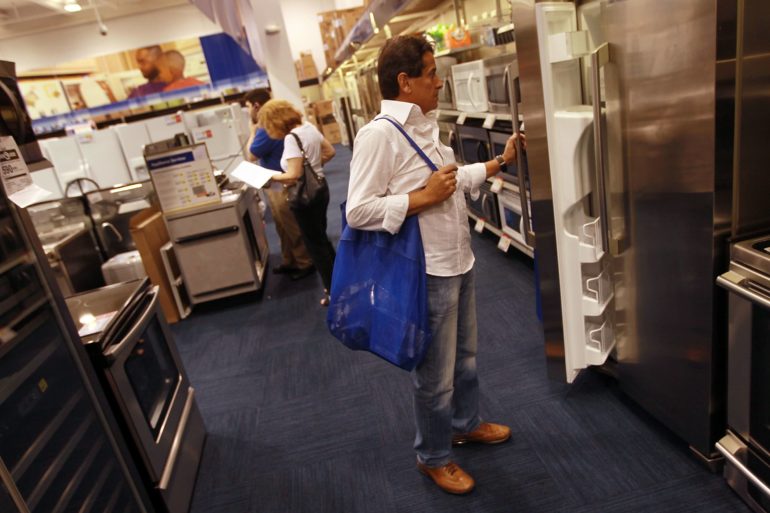As Americans move into new houses, remodel homes and watch real estate values rise, Best Buy CEO Corie Barry said they are buying appliances and big-screen TVs and hiring the company to set up new technology.
The strong housing market is one of the key reasons why the consumer electronics retailer exceeded analysts’ expectations for fiscal first-quarter earnings, according to Barry. She said stimulus checks also fueled spending on home theaters, appliances and computing.
“Even with the elevated demand we have seen throughout the pandemic, we believe the nesting phenomenon will continue to drive demand for products and services that help customers improve their home experience,” she said on an earnings call.
Home prices have been rising for months, as housing supply falls to near-record lows and interested buyers make competitive bids. Home prices in March saw the biggest gain in over 15 years, according to the S&P CoreLogic Case-Shiller National Home Price Index. The pandemic has intensified those trends by nudging some consumers to move out of dense cities and into suburban or rural areas where they can have bigger yards or a home office.
That has buoyed demand for several pandemic beneficiaries, including Home Depot and Lowe’s. Other retailers have also stepped up investments in home goods. For instance, Walmart has teamed up with Gap to launch an exclusive brand of bedding, bath and other home accessories.
For Best Buy, the hot housing market is a boon that has extended across services and merchandise, Barry said. She said it has been a sales driver, particularly as people settle into new homes. Sales online and at stores open at least 14 months grew by 37.2% compared with the year-ago period.
“If you think about a moving experience right now, it’s not just that you want new appliances, you want all of your connected devices to work for you in a new environment,” she said on a call with reporters. “And that may look like new TVs. It may look like a new home theater setup. It might look like a new office setup now, for many of us, or a new learn-from-home setup.”
She said Best Buy has a “unique advantage” by selling products and offering services such as home installations or tech consultations.
“We all know that there’s nothing more frustrating than when you move in and your wireless network doesn’t work on day one — especially in the life that we’re living,” she said.
The company has seen new customers trend younger, with millennials becoming Best Buy’s largest cohort of customers over the past 12 months, Barry said. Millennials, who range in age from 25 to 40, according to the definition of the Pew Research Center, have also been the generation that’s driving home sales as they get married, adopt pets and have children.
Real estate trends could help Best Buy as it faces tough comparisons in the quarters ahead. It had particularly high sales of technology during the pandemic — such as laptops and computer monitors — as more people worked, cooked and attended school at home.
Some analysts have warned that the pandemic may have pulled forward purchases, which could dampen demand. For instance, analysts at Wedbush downgraded the company’s stock in late April to neutral, saying home improvement and home furnishing retailers will see bigger gains than Best Buy this year. The equity research firm lowered Best Buy’s price target to $125, about 5% higher than where shares are currently trading.
The retailer raised its forecast for the first half of the year, citing “extraordinarily high” demand in the first quarter that has continued into the second. Yet Chief Financial Officer Matt Bilunas acknowledged uncertainty in the second half of the year on an earnings call Thursday. He said consumers may spend less on consumer electronics as they spend more on eating out or taking vacations.



